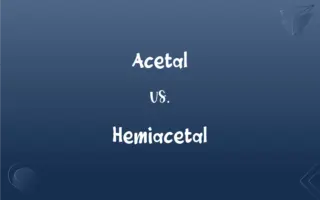Facultative vs. Obligate: What's the Difference?
Edited by Janet White || By Harlon Moss || Updated on October 28, 2023
Facultative implies an optional or occasional mode of living, while obligate denotes an absolute requirement or necessity.

Key Differences
Facultative describes organisms or behaviors that have the flexibility to operate under varying conditions, while obligate refers to organisms or behaviors that are restricted to a single condition or mode of living.
In the biological realm, a facultative anaerobe can live in the presence or absence of oxygen. In contrast, an obligate anaerobe must live without oxygen and will die if exposed to it.
Facultative organisms or behaviors show adaptability and can switch between different modes based on environmental conditions. Obligate organisms or behaviors, however, have a strict, singular requirement and cannot deviate from it.
For example, a facultative parasite can live both as a parasite and a free-living organism. On the other hand, an obligate parasite depends entirely on a host for its survival.
In essence, while facultative denotes flexibility and adaptability to multiple conditions, obligate emphasizes strict specificity and an unchanging mode of existence.
ADVERTISEMENT
Comparison Chart
Flexibility
Highly adaptable to various conditions.
Strictly specific to one condition.
Requirement
Optional or occasional.
Absolute or necessary.
Biological Example
Facultative anaerobes (can live with or without oxygen).
Obligate anaerobes (can only live without oxygen).
Dependence
Can switch between different modes.
Completely dependent on one mode.
Nature
Demonstrates versatility.
Demonstrates singularity and consistency.
ADVERTISEMENT
Facultative and Obligate Definitions
Facultative
Facultative describes adaptability based on environmental variations.
The facultative nature of the fungi allows it to grow on various substrates.
Obligate
Obligate implies a lack of flexibility and adaptability.
The bacterium is an obligate anaerobe, dying when exposed to oxygen.
Facultative
Facultative implies a choice between two or more conditions or lifestyles.
The insect is a facultative carnivore, also incorporating plants in its diet.
Obligate
Obligate refers to a strict requirement or necessity for a particular condition.
The fish is an obligate freshwater species and cannot survive in saline waters.
Facultative
Facultative denotes a non-strict preference for a particular condition or mode of living.
The worm is a facultative parasite, sometimes living freely in the water.
Obligate
Obligate signifies complete dependence on a specific condition or lifestyle.
The plant is an obligate carnivore, feeding only on insects and small animals.
Facultative
Facultative signifies optional behavior or functionality.
The plant has facultative roots that can absorb atmospheric moisture when required.
Obligate
Obligate denotes organisms or behaviors that cannot deviate from their mode of living.
The obligate nature of the bird's diet means it eats only seeds.
Facultative
Facultative pertains to the capability of living under diverse conditions.
The bacterium is facultative, thriving in both aerobic and anaerobic environments.
Obligate
Obligate denotes an organism restricted to a singular mode of existence.
The mite is an obligate parasite, relying solely on its host for survival.
Obligate
To compel or constrain by a social, legal, or moral requirement.
FAQs
Is an obligate organism adaptable to various conditions?
No, obligate organisms are strictly specific to one condition or mode of living.
How does obligate describe an organism's dependence on specific conditions?
Obligate indicates an absolute requirement or dependence on a particular condition.
How would you define a facultative parasite?
A facultative parasite can live both as a parasite and as a free-living organism.
Can a facultative organism switch between different modes?
Yes, facultative organisms can switch between modes based on environmental conditions.
In what kind of environments would a facultative anaerobe thrive?
A facultative anaerobe can thrive in both the presence and absence of oxygen.
What does facultative signify in terms of adaptability?
Facultative denotes high adaptability to various conditions.
Why is an obligate parasite completely dependent on its host?
An obligate parasite has evolved to rely solely on its host for survival and cannot live independently.
Are facultative behaviors mandatory?
No, facultative behaviors are optional or occasional, based on conditions.
Would an obligate carnivorous plant consume any plant material?
No, an obligate carnivorous plant would exclusively feed on insects and other small animals.
What happens to an obligate anaerobe in the presence of oxygen?
An obligate anaerobe typically dies or is harmed when exposed to oxygen.
Are obligate behaviors optional?
No, obligate behaviors are mandatory and specific to a particular mode of living.
In what kind of habitats would an obligate freshwater fish live?
An obligate freshwater fish would live exclusively in freshwater habitats and cannot tolerate saline waters.
How does the facultative nature of an organism impact its ecological role?
The facultative nature allows organisms to occupy diverse niches and adapt to environmental changes.
How restrictive is the term obligate when describing an organism's habitat preference?
The term obligate is highly restrictive, indicating an organism's absolute requirement for a specific habitat.
Can a facultative carnivore also consume plants?
Yes, a facultative carnivore can consume both meat and plants.
Why might a facultative organism have an advantage in fluctuating environments?
A facultative organism's adaptability allows it to thrive under varying conditions, providing a survival advantage.
Can facultative anaerobes perform aerobic respiration?
Yes, facultative anaerobes can perform both aerobic and anaerobic respiration.
Are obligate traits flexible?
No, obligate traits denote strict specificity and lack of flexibility.
Is a facultative trait essential for survival?
No, a facultative trait is not essential; it offers adaptability but isn't a strict requirement.
What is an example of an obligate behavior or characteristic?
An obligate anaerobe can only exist in environments devoid of oxygen.
About Author
Written by
Harlon MossHarlon is a seasoned quality moderator and accomplished content writer for Difference Wiki. An alumnus of the prestigious University of California, he earned his degree in Computer Science. Leveraging his academic background, Harlon brings a meticulous and informed perspective to his work, ensuring content accuracy and excellence.
Edited by
Janet WhiteJanet White has been an esteemed writer and blogger for Difference Wiki. Holding a Master's degree in Science and Medical Journalism from the prestigious Boston University, she has consistently demonstrated her expertise and passion for her field. When she's not immersed in her work, Janet relishes her time exercising, delving into a good book, and cherishing moments with friends and family.
































































